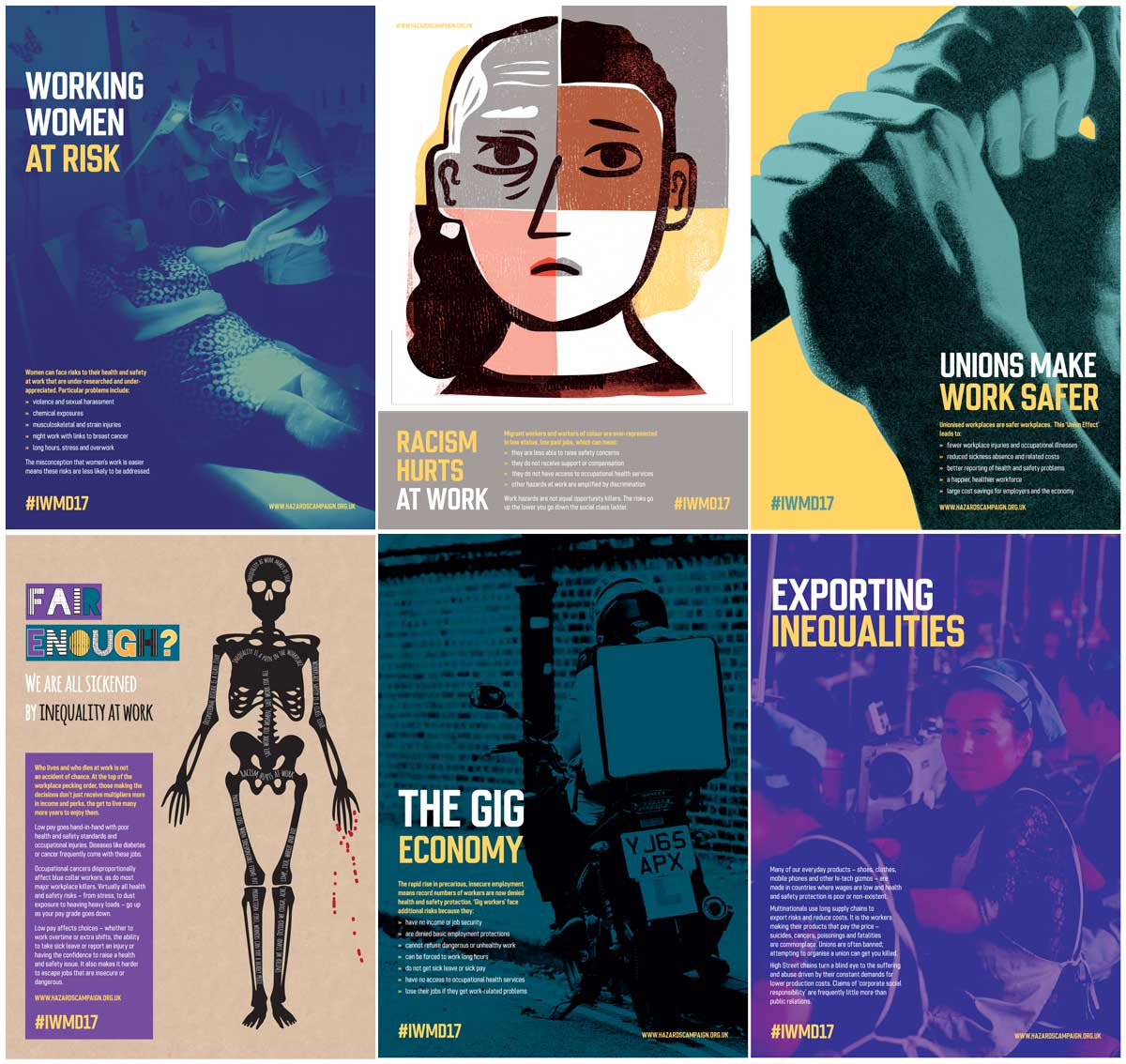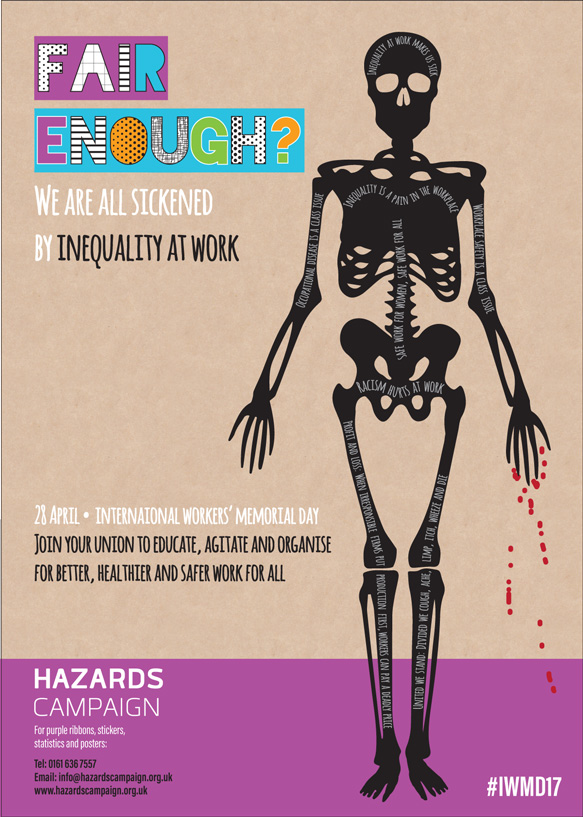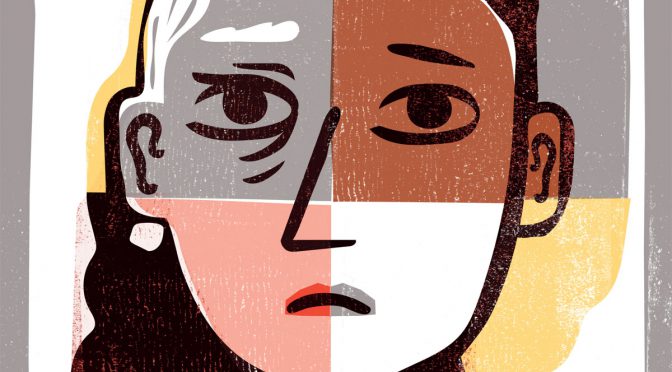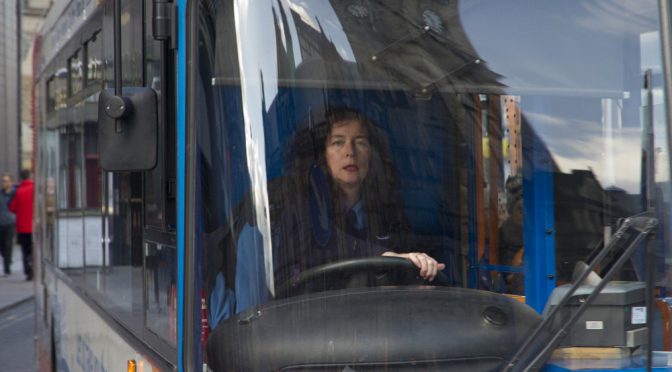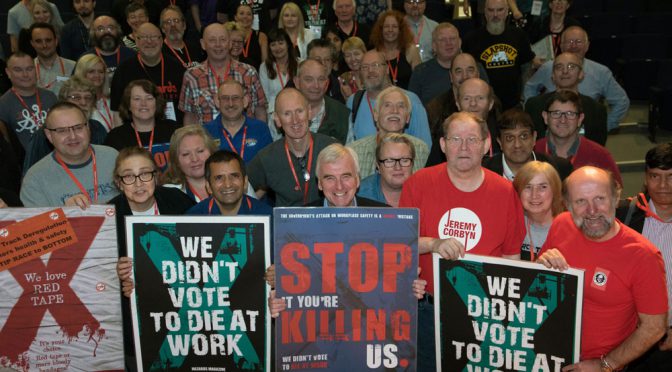Associates of Greater Manchester Hazards Centre explain why International Workers’ Memorial Day is important in remembering those killed or injured at work, and those who continue to be vulnerable in the workplace.
NEW: 28 April graphic resources from the Hazards Campaign
Hazards Campaign has produced a set of six large banners based on the 28 April theme ‘Unsafe and unfair – discrimination on the job hurts us all’. The banners will be displayed initially at the People’s History Museum in Manchester, UK – 21st April – 1 May 2017.
Banner 1 Fair enough? We are all sickened by inequality at work
Banner 2 Working women at risk
Banner 3 Racism hurts at work
Banner 4 The gig economy
Banner 5 Exporting inequalities
Banner 6 Unions make work safer
Poster: Face it. Unfair workplaces are a real pain. Only unions can make things better.
Hazards Campaign has produced posters for International Workers’ Memorial Day. Order posters, forget-me-knot ribbons and other 28 April resources from the Hazards Campaign, tel: 0161 636 7557; email: info@hazardscampaign.org.uk
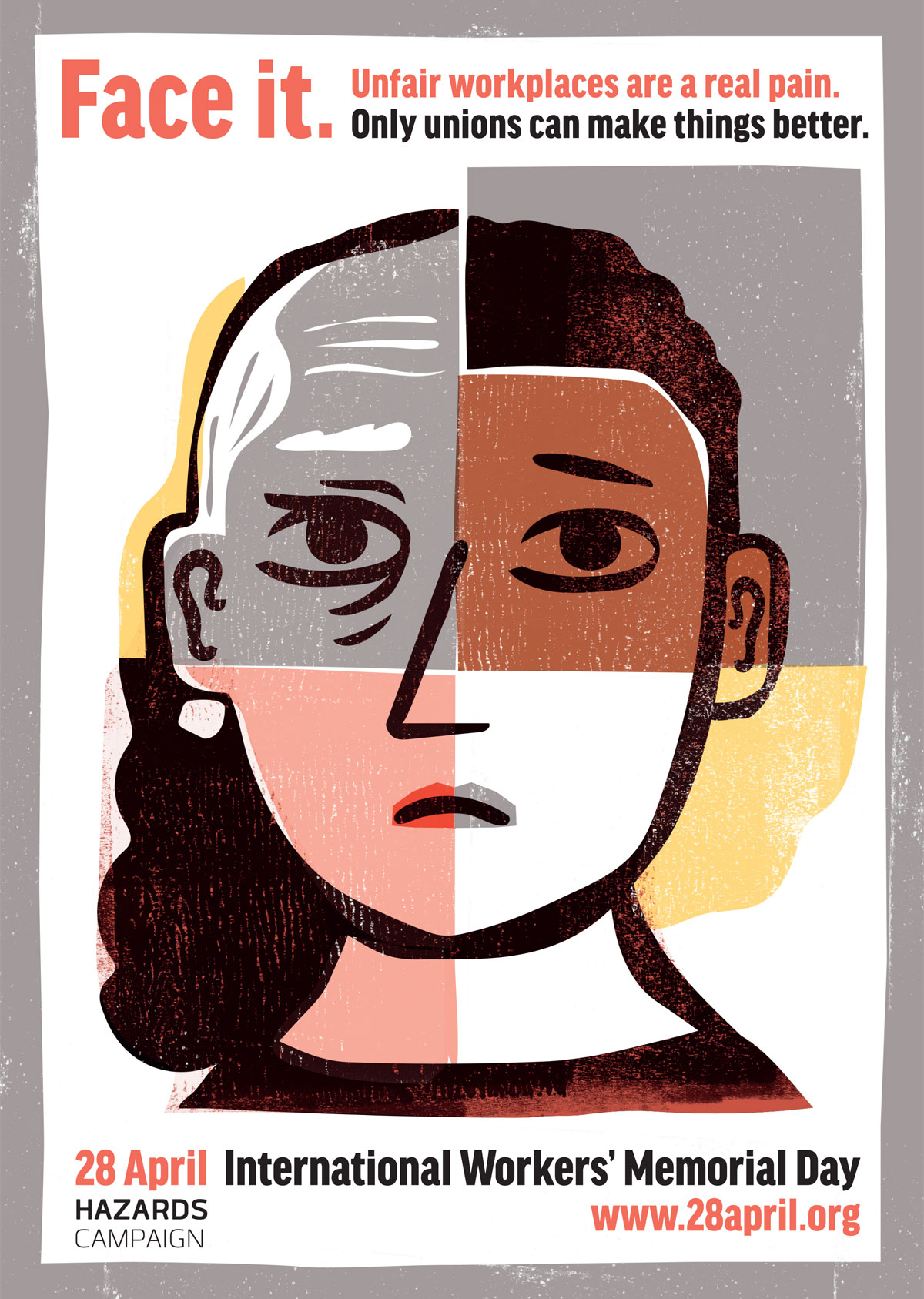
Poster: Fair enough? We are all sickened by inequality at work
Hazards Campaign has produced a dedicated poster for International Workers’ Memorial Day. Order posters, forget-me-knot ribbons and other 28 April resources from the Hazards Campaign, tel: 0161 636 7557; email: info@hazardscampaign.org.uk
Count down to Workers’ Memorial Day, 28 April 2017!
Are you ready for the biggest health and safety event on the calendar, anywhere? International Workers’ Memorial Day is set for Friday 28 April, highlighting how inequalities at work can be seriously bad for your health. Protests, marches, training days, workplace inspections and flash mobs are being planned. There’s a good chance there will be an event near to you – if not, there’s still time to organise one.
TUC Workers’ Memorial Day 2017 events listing. Find out what’s happening worldwide on International Workers’ Memorial Day.
Get your resources for IWMD17
Order posters, forget-me-knot ribbons and other 28 April resources from the Hazards Campaign, tel: 0161 636 7557; email: info@hazardscampaign.org.uk
Purple Forget me Knot ribbons:2017 WMD ribbon order form
Two Free #IWMD17 Posters
Face it. We are all sickened by inequality at work, editorial by ITUC general secretary Sharan Burrow, April 2017.
Unsafe and unfair – discrimination on the job hurts us all, ITUC briefing for, 28 April 2017.
FACK Statement on the prosecution of Crossrail construction companies
On 12th April at Westminster Magistrates Court, three companies are being prosecuted for the death of one worker and the injury of two others workers on Crossrail: BAM Nuttall Limited, Ferrovial Agroman (UK) Ltd, and Keir Infrastructure and Overseas Ltd. (1).
They are being prosecuted in relation to three incidents that took place during the construction of the new Crossrail railway tunnel construction, which runs east to west across London.
All three companies will to face four charges each. Two relating to the death of Rene Tka’cik on the 7 March 2014, and one each relating to injuries to Terrence Hughes on the 16 January, and Alex Vizitiu on 22 January 2015. Rene Tka’cik died after he was crushed by falling concrete on the 7 March 2014 while working on the Fisher Street cross-over tunnel.
FACK stands in solidarity with the family of Rene Tka’cik, the injured workers, Terrence Hughes and Alex Vizitiu, the Construction Safety Campaign, CSC, and London Hazards in their silent vigil outside the magistrate’s court at 2pm wearing purple forget-me-knot ribbons. Purple ribbons are the symbol of International Workers Memorial Day 28 April every year which is dedicated to ‘Remembering the Dead and Fighting for the Living’ because no one should ever go to work and be killed. (2)
Almost all deaths and injuries at work are due to employers’ mismanagement and these three companies are being prosecuted for alleged breaches of health and safety law.
There have been many reports of health and safety mismanagement of companies working on Cross Rail from blacklisting for reporting health and safety issues that went on to seriously hurt other workers, for poor welfare facilities –workers having to walk miles for a toilet..
It is completely unacceptable in 2017 that large construction companies can neglect workers health, safety and welfare and all employers must be held to account for the sake of justice for those killed and harmed, their families, and for deterrence: to stop other employers corporate killing. .
FACK families say:
“No-one we loved died from too much regulation and enforcement but from far too little. We believe everyone should be able to go work and come home safe every day as the law requires. No employer should be able to flout the law and put anyone at risk. Our hearts go out to Rene’s family and we hope they will get some justice, and that employers will stop hurting workers.”
More information contact FACK 0161 636 7557 or 07929800240
Notes to Editors
1. HSE Notice: HSE Prosecution annoucement
2. Workers Memorial Day 28 April:
Founder Members of FACK:
Dawn and Paul Adams – son Samuel Adams aged 6 killed at Trafford Centre,10th October 1998
Linzi Herbertson -husband Andrew Herbertson 29, killed at work in January 1998
Mike and Lynne Hutin – son Andrew Hutin 20, killed at work on 8th Nov 2001
Mick & Bet Murphy – son Lewis Murphy 18, killed at work on 21st February 2004
Louise Taggart – brother Michael Adamson 26, killed at work on 4th August 2005
Linda Whelan – son Craig Whelan 23, (and Paul Wakefield) killed at work on 23rd May 2004
Dorothy & Douglas Wright – son Mark Wright 37, killed at work on 13th April 2005
Hazards 2017 conference booking form now available to download
Hazards 2017 Conference: Organising health, safety and welfare in an insecure world
28th – 30th July 2017, Keele University – Download the booking form
Hazards Conference is the UK’s biggest and best educational and organising event for trade union safety reps and activists. As usual, we have invited a number of international and national trade union leaders, academics and campaigners who will share their knowledge and experience. A comprehensive workshop programme to improve your skills and provide you with practical information to support your role as a rep/steward.
The opening plenary on Friday evening will feature inspiring speakers including Jessica Martinez from Hazards Campaign sister organisation, US National COSH to talk about the joint threats we face and how we can work together to fight them. There will be great discussions in the plenaries and in meetings. One of the three meetings is about the therapy industry being used to individualise mental ill health in the workplace, undermining employers’ responsibility to control the risks and ignoring the effect of government policies and spending cuts causing growing poverty and inequality. Another meeting will focus on how we eliminate hazardous substances such as carcinogens in the workplace and environment, and a third one on how we engage vulnerable and exploited workers in new organising methods. In addition, there will be a number of campaign meetings, where activists will share information about their campaign successes and challenges.
Hazards 2017 takes place in the wonderful setting of Keele University and is attended by over 350 trade union reps from all unions, from different sectors and employers. There will be plenty of trade union resources available at the exhibition stall for you to take away, along with developing your network of contacts, knowledge and organising skills to improve your workplace health and safety. So you can go home revitalised to educate, agitate and organise to make work safe!
Anniversary of the deaths of Mick Collings, Chris Huxtable, Ken Cresswell, and John Shaw
FACK Statement for use 23.2.17
Anniversary of the deaths of Mick Collings, Chris Huxtable, Ken Cresswell, and John Shaw in the collapse of Didcot boiler house on 23.2.16
Families Against Corporate Killers (FACK) would like to mark the first anniversary of the deaths of four workers Mick Collings, Chris Huxtable, Ken Cresswell, and John Shaw, today Thursday 23rd February 2017.
Mick, Chris, Ken and John were working for Coleman’s at Didcot power station on the demolition of boiler houses for RWE. The boiler houses were being prepared for demolition when something went terribly wrong and it collapsed upon them, burying them under tonnes of rubble.
The body of Mick Collings was found that day but Chris, Ken and John were not found until more than six months later.
The trauma of their deaths and the agonising time taken to recover the bodies of the three men they loved – partners, husbands, fathers – has been incredibly traumatising and added to the grief of all the families concerned.
“I am in awe of the courage and strength they have all shown and hope that the investigation will provide the answers they need.”
FACK has offered support to three of the families and wishes to pay tribute to their steadfast concern to get their men out, to find out what happened, why they died, to be the voices for their men and to bear witness to their lives however painful and traumatic that has been.
Hilda Palmer for FACK said: “We have never known of such a tragedy where workers were killed but not recovered for so long and the agony to the families is heartbreaking. The families now await the result of the Police and HSE investigation into the cause of the collapse and who, if anyone, is accountable. This will not bring back the men they loved, but the families are entitled to as much justice as possible. It is also vital that all lessons are learned as this must never happen again. Demolition workers doing their job should not be killed and remain under rubble for months adding immensely to the grief and trauma of their families. I am in awe of the courage and strength they have all shown and hope that the investigation will provide the answers they need. The FACK families send their love, strength and hopes to the families of Mick Collings, Chris Huxtable, Ken Cresswell and John Shaw and we are all thinking of you today especially, but always.”
For more information contact FACK Facilitator Hilda Palmer 0161 636 7557 079298 00240
Founder Members of FACK:
Dawn and Paul Adams – son Samuel Adams aged 6 killed at Trafford Centre,10th October 1998
Linzi Herbertson –husband Andrew Herbertson 29, killed at work in January 1998
Mike and Lynne Hutin – son Andrew Hutin 20, killed at work on 8th Nov 2001
Mick & Bet Murphy – son Lewis Murphy 18, killed at work on 21st February 2004
Louise Taggart – brother Michael Adamson 26, killed at work on 4th August 2005
Linda Whelan – son Craig Whelan 23, (and Paul Wakefield) killed at work on 23rd May 2004
Dorothy & Douglas Wright – son Mark Wright 37, killed at work on 13th April 2005
FACK stories: http://www.hazardscampaign.org.uk/fack/about/index.htm Plus FACK DVD ‘Face the FACKs: the human cost of workplace killing’ http://www.hazardscampaign.org.uk/fack/resources/facethefacks.pdf
PM’s speech on mental health ‘woefully inadequate’
Hazards Campaign comment on Prime Minster Theresa May’s announcement of a package of measures covering mental health support in our schools, workplaces and communities. 10 January 2017
Whilst the Hazards Campaign welcomes the discussion about how to help workers suffering from mental ill-health, Theresa May’s speech is woefully inadequate, full of empty words and it comes at a time when the Government is under considerable pressure because of the crisis in the NHS, yet she offers no new resources to handle the extra demands of her proposals.
The NHS crisis is based on political dogma of privatisation. A crisis which has seen children being sent hundreds of miles to find suitable mental health support. A crisis which has seen people waiting for days in general hospital beds whilst mental health beds and the support they desperately need, become available. This is being rolled out also at a time when there are funding cuts for our schools, a time when our teachers continue to be over worked, and there are excessive pressures on our children from continuous testing. Their mental health will not be improved unless all this is tackled and not by placing new demands on them.
The PM talks about a ‘shared society based on the values of citizenship, responsibility and fairness’ when in reality our society is more divided and unequal than it has ever been in recent history.
“Mental health first aid is like putting a sticking plaster over the festering sore. The injury needs to be prevented.”
The welfare system is broken and people are taking their own lives rather than face the misery of unbearably stressful work, poverty, debt and homelessness. Nowhere in the speech does the PM address this. Nowhere does she mention trade unions or safety reps who are in the front-line dealing with the mental health epidemic caused by government and employers actions.
We do not need another report, what we need is urgent action. Action which forces employers to ensure that their employees’ mental health is not made worse by their workplaces. That they are not having to do the same workload with fewer workers, or increased work on fewer hours. That at the end of their 12 hour shifts they are not ill from fatigue. That their employment is not based on a series of zero hours contracts leaving them unable to challenge injustices and unfairness or unsafe working conditions.
This is not just in precarious employment, not just in casual employment, but applies to workers in government departments, in universities, in colleges, who are all working in unacceptably stressful jobs because of the excessive demands made on them, the insecurity of their work, and often the low wages do not cover the bills.
Mental health first aid is like putting a sticking plaster over the festering sore. The injury needs to be prevented.
As there is so little done to help people with mental health problems at work at the moment, it would be hard to reject any real action to tackle this. We welcome the focus on the huge and growing epidemic of work-related stress illnesses and the way in which stress and mental ill-health have become endemic in most workplaces. However as a proposal ‘to transform mental health support’ this falls way short.
Government policies fostering inequality, injustice at work, lack of access to justice for resolutions, a culture that blames those who are ill and sick as shirkers and malingers, in-work poverty from low wages that do not pay the bills creating debt and insecurity exacerbated by zero hours and other insecure contracts, and the endlessly increasing pressures upon workers are all major causes of mental ill-health at work. There is no clear acknowledgement that these and the way work is organised, is making so many workers mentally ill.
Tackling the work factors that cause stress is essential to ‘drive work with business and the public sector to support mental health in the workplace’. Much of the proposal focuses on individuals already suffering and we welcome the promise to provide more help and support and to ‘review recommendations around discrimination in the workplace on the grounds of mental health’.
However, Government policies and workplace practices are driving this huge epidemic of work related depression, anxiety and other mental ill-health.
If Theresa May’s speech is not to just become a speech which at best mentions mental illness and at worst it is a deflection from the current NHS crisis, then we need mental health support to be treated more seriously, with more resources, achievable targets, support for trade union safety reps and for all actions by employers which make people ill, to be dealt with more severely.
Hazards 2016 – conference report and documents
Hazards 2016 conference 29-31th July 2016, Keele University
Building Resistance to Support Safety Reps
The Hazards conference is the largest conference in the northern hemisphere solely for Trade Union health and safety reps. This year’s was called ‘Building Resistance to Support Safety Reps. It was a packed weekend with 350 delegates, fantastic speakers, valuable workshops and inspiring meetings.
Hazards 2016 started with the Friday plenary session. Hilda Palmer of the Hazards Campaign welcomed delegates, explained what the Hazards Campaign is, listed useful website links, outlined #Haz2016 theme, the new format programme and arrangements, gave thanks to sponsors, and noted that a third to half of delegates are new to Hazards.
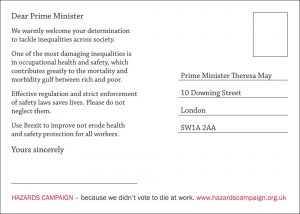
The Hazards Campaign’s blunt message to the new Prime Minister warns her not to neglect the effective regulation and strict enforcement of safety laws
Delegates were asked to sign a ‘Stop it you’re killing us’ postcard included in their delegate bag, to send one by e-mail , share it on Twitter and Facebook, and take it back to workplaces and branches. The introduction ended with a minute silence to remember all those workers – over 50,000 – who have died at, and by, work over the last year and especially Linda Whelan a founder member of FACK, Families Against Corporate Killers, and those killed in multi-fatality incidents such as the five migrant workers killed at Hawkeswood Metals, in Birmingham, the four killed at Bosley Wood Flour Mill, and the four killed at Didcot power station, of whom three were still buried under the rubble.
Hugh Robertson, TUC Health and Safety officer, spoke about ‘Protecting health and safety after Brexit’ describing the potential implications of leaving the EU on workers safety and health, threats from new trade deals, what regulations are specifically at risk and the TUC’s campaign on protecting workers rights.
Aida Ponce Del from the European Trade Union Institute brought solidarity greetings and the message that ‘Despite Brexit ‘Occupational health and safety should REMAIN’.
Dr. Anne Raynal, an ex-HSE senior medical inspector described ‘HSE’s failure to enforce the duty to prevent occupational diseases’. Anne spoke about the lack of reporting from employers on workplace illness and the subsequent lack of prosecutions and enforcement. She said “On average there are only 1,600 disease notifications under RIDDOR per annum for the 516,000 new cases of work-related ill health that HSE estimate occurs every year, a staggeringly low 0.03% reported. Consequently there is little action, prosecution or active prevention taking place to stop workers being made ill by work.”
Professor Steve Tombs from the Open University and Centre for Crime and Justice Studies, spoke about his recent research: ‘Better regulation’ Better for whom? Steve talked about ‘dismantling a system of regulation – social protection – which was put into place from the 1830s onwards’, the privatisation of enforcement and the restrictive ‘Growth duty’ placed on enforcers. He detailed the reduction in the number of HSE and Local Authority inspections (fell by 69%, preventive inspection fell by 96% for Local Authority Environmental Health Officers, EHOs), prosecutions (fell by 35% for HSE and 60% for L.A. EHOs). Steve also raised concern about the Primary Authority Scheme which enables businesses across different local authorities to elect one authority to regulate all of its sites across all LAs. A copy of Steve’s briefing was provided in delegates’ bags and can also be found here.
Under the new format, there was no Saturday plenary, so delegates went straight from a hearty breakfast into a full-on programme of workshops, seminars and meetings that were broken down into three themes: 1. Workplace organisation, 2. Dealing with risks and 3. Employers offensive/Workplace tyranny.
Workshop, Seminars and meetings
Theme 1 – Workplace organisation
Workshop 1 Safety Reps Functions and employers duties
Download the notes here
Workshop 3 Recruiting safety reps and improving workplace health and safety
• Strengthening involvement / Recruiting Safety Reps/Activists
• Building organisation Powerpoint
• Key components of the trade union attitude to health and safety
• Workplace safety flowchart
Seminar 1 Sharing experiences of workplace organisation and good practice
Meeting 1 Improving support for safety reps Chair: Dan Shears, GMB, Speakers: Julie Weeks & Michelle Marshall Seminar on Work Organisation – Notes from the seminar & Well-Being or Worse-Being?
Theme 2 – Dealing with risks
Workshop 6 Identifying Hazards/Risks, Hierarchy of control
• Download the notes here
• Identifying Hazards and Risks
• Looking for examples of the Hierarchy in Use
Workshop 9 Finding out what harms us
Download the notes here
Seminar 2 Sharing experiences and making the case for dealing with what harms us Dealing with what harms us
Meeting 2 Death due to overwork Karoshi &-suicide Karojisatsu Chair: Susan Murray UNITE, Speaker: John Bamford
Theme 3 – Employers offensive / workplace tyranny
Workshop 13 Resisting Resilience
More details from Hazards magazine here
Workshop 14 Behavioural Safety
Download the notes here
Seminar 3 Sharing experiences of prioritising action against employers offensive
Meeting 3 UK and global threats to health and safety organisation
Ian Tasker of STUC spoke on Threats to health and safety in Scotland. He illustrated the higher rate of work harm than in England and Wales, the need for devolution of enforcement and regulation of health and safety; the Smith Commission, the Action Plan for Scotland and he linked workplace deaths, injuries and illnesses with austerity and poverty.
Hugh Robertson made clear that trade deals such as CETA and post Brexit trade deals are the biggest threat to health and safety See Global threats
Hugh also made the excellent point that the HSE boasts of GB having the ‘best health and safety in the world’ with low fatality and injury figures is only because our manufacturing is outsourced to Asia where making those same goods probably causes more deaths, injuries and ill-health now than when they were made in this country.
Omana George, Director of Asia Monitor Resource Centre, AMRC, spoke about the huge health and safety risk facing workers in almost all sectors in Asia – now the workshop of the world – and especially affecting informal, unorganised workers. She described the work of AMRC and of ANROEV, the Asian Network for the Rights of Occupational and Environmental Victims. She described how about ten years ago they began to focus more on occupational ill health thinking the worst disasters of factory fires were over… But then they started happening all over again. Omana George AMRC
Campaign meetings
One of the six campaign meetings to end the day was run by Sarah Wiktorski from the ‘Better than Zero’ campaign. It was very inspiring describing their work in Scotland with trade unions and the Scottish TUC. the actions were led by young people who used challenging and innovative activities against zero hours contracts and working practices which include having to pay multi millionaire restaurant owners a percentage of their earnings. (See YouTube clip below).
Another inspiring campaign meeting was run by Barry Faulkner of UNITE on the health and safety problems experienced by vulnerable workers at the Shirebrook depot of Sports Direct . He described how those workers fought back with the aid of union and community groups .
TTIP meeting – Summary
Legal Update from Stephen Nye and Satinder Bains from Irwin Mitchell
Asbestos update: JUAC papers here https://www.teachers.org.uk/help-and-advice/health-and-safety in our health and safety A to Z, under ‘A’. The 2nd and 3rd are all about the impact of academisation or attached
Final plenary
The final plenary on Sunday started with Sarah Wiktorski on the ‘Better than Zero’ campaign and was followed by David Hardman, UCU, who along with colleague Mark Campbell was victimised then sacked from London Metropolitan University. David for his activities on stress as a safety rep.
Sanjiv Pandita, ex Director of AMRC and now working with the Hazards Magazine and Campaign and activists round the world to set up a Global Occupational Safety and Health, GOSH, network to combat the global threats to our lives and health. Sanjiv talked about the huge manufacturing companies employing 50-80 thousand workers in enormous hangars who make our phones and trainers. He showed pictures of the slums they are forced to live in because of the poverty wages they are paid, reminiscent of the UK Victorian slums during the industrial revolution. Sanjiv reminded us of the way global capitalism pits us against each other, and exports hazards and ill health to other workers to make the products we buy and use and why we must work together globally to fight back, hence the need for GOSH. He talked about the lack of accurate reporting of deaths, injuries and illness caused by work in Asia, which means that India’s high work death rate appears, theoretically, comparable to that of Denmark! He showed a rough recalculation, using Hazards Magazine/Campaign estimates, that pointed to the the death toll in Asia being at least 4 million workers per year! PowerPoint presentation
We also heard from Blacklisting Support Group campaigner Royston Bentham on their great achievements and what must be done next. Royston praised and thanked John McDonnell for all the support he and Jeremy Corbyn have given the blacklisted workers and how they have fought alongside them every step on the way through Scottish enquiries and court cases. See the Hazards magazine feature Victory!
Dave Smith’s updated book, Blacklisted: The secret war between big business and union activists, is now on sale from the New Internationalist.
The Hazards Campaign demands were read out and voted upon before John McDonnell, shadow chancellor got up to speak and told us we would have all of those and more.
John McDonnell met his promise to speak to the conference, made months ago in less hectic times, and came early and stayed late, talking time to talk knowledgeably to delegates about their specific issues. As John had been criticised for not doing anything for workers, the irony of his commitment was not lost on the delegates. John’s speech promised that health and safety and trade union rights would be at the top of the agenda of the Labour opposition and any future government led by Jeremy Corbyn. he accepted our demands, added to them and invited us to send him a paper which he promised to put to the shadow cabinet for debate.
There were many highlights from the conference, plenty of networking and sharing of information including: the reps that talked about the lack of welfare-toilet facilities available to them because they were drivers or weren’t being released to be able to take toilet breaks; the terrible slum conditions people are working in in Asia who make phones and trainers; the lack of protection and enforcement for UK workers, and finally the inspirational speech by John McDonnell who offered the support of the Labour Party to Health and Safety reps and the Hazards Campaign.
We were reminded again to send a postcard to Theresa May to put pressure on the new Prime Minister to support and not erode health and safety legislation. http://www.hazardscampaign.org.uk/postcard
